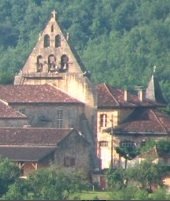Yesterday Montcabrier, along with the rest of France, paused to commemorate Armistice Day.
I have to confess, we don’t always make it to village events. I suppose the curse of running your own business is the ever-present feeling that there is something you should be doing, something more important than whatever is going on out there in the big wide world. But today we were determined, so a little before 11:00 we hopped in the car and wound our way up to the square.
There, gathered in front of the church, were between 50-75 of our fellow “Cabrimontains,” as inhabitants of Montcabrier are called. The mayor, the two schoolteachers, and the baker’s wife were all there, as were assorted parents of Sebastian’s classmates and a handful of other villagers, both friends and strangers. After a few minutes of saying bonjour, of handshakes and bisous, Jean-Pierre the mayor corralled everyone over to the Monument des Morts.
Montcabrier’s war memorial is a stone obelisk bearing eighteen names of men from this tiny village who gave their lives for France during the First and Second World Wars. It is smaller than many a tombstone, so we all gathered closely around under the large mulberry tree to hear Jean-Pierre give the customary speech. To one side remained a cluster of seven children, some with flowers. As Jean-Pierre spoke, the children looked on, quiet and solemn, trying with their little brains to follow the mayor’s words on war and sacrifice, on honor and tragedy. It was a scene out of a sentimental French film.
Except that among those little standard-bearers of tomorrow’s France was my son.
It seemed strange to me at first. Setting aside for a moment the color of his passport, what is Sebastian? Half American, half Dutch, he is growing up French. I’m feeling more patriotic than usual these days in the wake of the election, and I could not help, for a moment, feeling uneasy at the thought of my son becoming a little Frenchman. But then Jean-Pierre spoke. The mayor’s speech could have dwelt only on the victories and defeats of his fellow villagers. It could have been a pompous invocation of the greatness of France. Instead he spoke of the sacrifice that so many made to keep France free; not just the Cabrimontains, not just the French, but also of the English and Americans and others who came to France and died by the thousands. He spoke of the African brigades who fought here, far from home. And he even spoke of the newfound hope, felt by so many all over the world, inspired by the election of Barack Obama. As if to underline the point, the commemorative wreath was laid by our village’s eldest veteran, not a Frenchman, but an Englishman who landed in Normandy on D-Day.
Jean-Pierre then read out the list of the men of Montcabrier who had died in the wars, each bearing the familiar-sounding family names of our friends and neighbors. And after each name, “mort pour la France” spoken softly by everyone in the crowd. Dead for France. It was touching, and honest, and humble, and as I watched Sebastian speak the words along with his classmates, his fellow villagers, my angst over his identity faded. If Obama is a post-racial American, then Sebastian is a post-national one. He is Cabrimontain. As the ceremony concluded with its minute of silence and Sebastian ran off to play tag with his classmates in the village square I couldn’t help but think that Cabrimontain is a pretty good thing to be.
Wednesday, November 12, 2008
Subscribe to:
Post Comments (Atom)





No comments:
Post a Comment